
The rowans or mountain-ashes are shrubs or trees in the genus Sorbus of the rose family, Rosaceae. They are native throughout the cool temperate regions of the Northern Hemisphere, with the highest species diversity in the Himalaya, southern Tibet and parts of western China, where numerous apomictic microspecies occur. The name rowan was originally applied to the species Sorbus aucuparia and is also used for other species in the genus Sorbus.
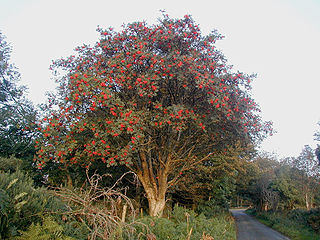
Sorbus aucuparia, commonly called rowan and mountain-ash, is a species of deciduous tree or shrub in the rose family. It is a highly variable species, and botanists have used different definitions of the species to include or exclude trees native to certain areas. A recent definition includes trees native to most of Europe and parts of Asia, as well as northern Africa. The range extends from Madeira, the British Isles and Iceland to Russia and northern China. Unlike many plants with similar distributions, it is not native to Japan.

Sorbus is a genus of over 100 species of trees and shrubs in the rose family, Rosaceae. Species of Sorbus (s.l.) are commonly known as whitebeam, rowan, mountain-ash and service tree. The exact number of species is disputed depending on the circumscription of the genus, and also due to the number of apomictic microspecies, which some treat as distinct species, but others group in a smaller number of variable species. Recent treatments classify Sorbus in a narrower sense to include only the pinnate leaved species of subgenus Sorbus, raising several of the other subgenera to generic rank.
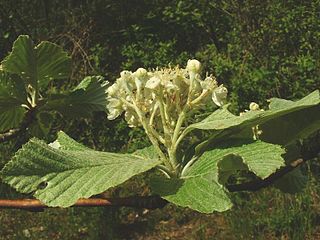
The whitebeams are members of the family Rosaceae, comprising the genus Aria. They are deciduous trees with simple or lobed leaves, arranged alternately. They are related to the rowans, and many of the endemic restricted-range apomictic microspecies of whitebeam in Europe are thought to derive from hybrids between the common whitebeam and the European rowan. Some are also thought to be hybrids with the wild service tree, and the service tree of Fontainebleau found in French woodlands.
The Arran whitebeams are species of whitebeam endemic to the island of Arran, Ayrshire, Scotland.

The tree species Sorbus americana is commonly known as the American mountain-ash. It is a deciduous perennial tree, native to eastern North America.
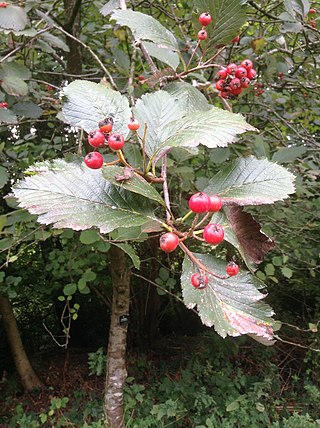
Hedlundia anglica, the English whitebeam, is a species of whitebeam tree in the family Rosaceae. It is uncommonly found in Ireland and the United Kingdom, with an entire British population estimated at about 600 individuals.
Sorbus oligodonta, also known as the kite-leaf rowan and white-fruited rowan, is a species of rowan found from the eastern Himalaya to south-central China, northern Vietnam and Myanmar.

Hedlundia hybrida, the oakleaf mountain ash, Swedish service-tree or Finnish whitebeam, is a species of whitebeam native to Norway, eastern Sweden, south-western Finland, and locally in Latvia.
Sorbus khumbuensis is a species of rowan in the family Rosaceae. It is part of the Sorbus microphylla aggregate with crimson fruits, turning white. It has small long-oval shaped leaves with 12-19 pairs of leaflets per leaf. It is native to eastern Nepal, and is named after the Khumbu area. This plant is cultivated in parks and gardens as an ornamental plant.

Sorbus scalaris is a species of rowan. It is native to western Sichuan and Yunnan in China where it grows in mixed forests on mountain slopes at altitudes of 1600–3000 m. S. scalaris is a shrub or small tree, 3–7 m tall.

Sorbus frutescens is a species of rowan native to Gansu province of China. Often mistakenly lumped in with Sorbus koehneana, it is a very small tree reaching only 2 m at maturity, with white fruit against dark green pinnate leaves which turn shades of red and bronze in autumn.
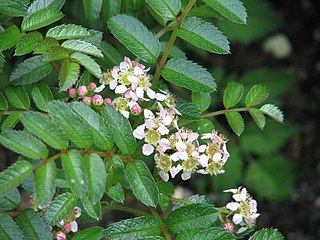
Sorbus poteriifolia is a species of rowan native to south-central China and northern Myanmar. It is a shrub found at 3000 to 4000 m above sea level. It has gained the Royal Horticultural Society's Award of Garden Merit as an ornamental.
Sorbus pseudohupehensis, the Chinese mountain ash, is a species of rowan native to Yunnan province in China. Available from commercial suppliers under a variety of names, it has gained the Royal Horticultural Society's Award of Garden Merit as an ornamental.

Sorbus rosea is a species of rowan native to Kashmir in Pakistan. It is a small tree with large pink flowers and berries, dark green leaves turning to red in the Autumn, and reddish bark with silver patches. It has gained the Royal Horticultural Society's Award of Garden Merit as an ornamental.

Sorbus ulleungensis is a species of rowan native to Ulleung Island of South Korea. Its cultivar 'Olympic Flame' has gained the Royal Horticultural Society's Award of Garden Merit as an ornamental. This medium-sized upright tree, growing to 8 m (26 ft), has large leaves which turn brilliant shades of red and orange in Autumn. Small white flowers in Spring are followed by bright red berries in the Autumn.
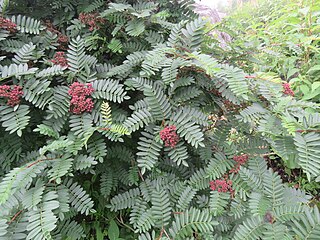
Sorbus microphylla, the small-leaf rowan, is a species of plant found in the Himalayas and China. It is probably a species aggregate. The berries are eaten by red pandas.
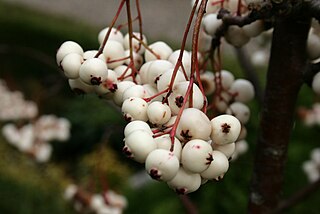
Sorbus koehneana, also known as Koehne mountain ash, is a species of rowan native to central and southeast China and Qinghai. It is found in mixed forests or thickets in mountains 2,300 to 4,000 m above sea level. The species epithet is named after Bernhard Adalbert Emil Koehne, a late 19th century German botanist. Sorbus koehneanahas white fruits and it's famous for the bright red color of its leaves in autumn.
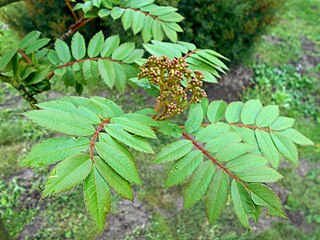
Sorbus discolor is a species of flowering plant in the family Rosaceae, native to China. Although it is recorded in wide use as an ornamental tree in the United Kingdom and other countries, Some European specimens labelled as Sorbus discolor have been found instead to be misidentified examples of Sorbus commixta, the Japanese rowan. Sorbus commixta fruit is bright orange to red, whereas the fruit of Sorbus discolor is white, or possibly dull pink to yellowish-orange.

Sorbus sambucifolia is a species of rowan native to Korea, northern and central Japan, Russian Far East and Alaska.
















